Jazznet: Chris Kelsey
Henrk Kaldahl dykker ned i Chris Kelsey's univers
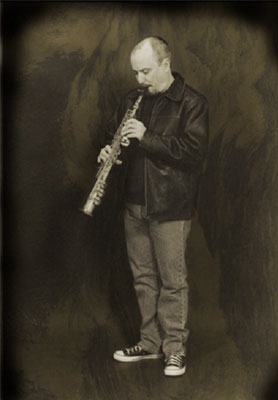 Saxofonisten Chris Kelsey, som bor i New York, besidder en af de mest karakteristiske instrumentale stemmer i moderne jazz. Hans ensembler har bestået (og består) af nogle af New Yorks fineste banebrydende kunstnere, herunder bassisterne Francois Grillot, Dominic Duval, og Ken Filiano; trommeslagerne Jackson Krall, Jay Rosen og Lou Grassi, og trombonist Steve Swell, blandt mange andre. Han har været leder for en lang række udgivelser på det prestigefyldte CIMP selskab og hans eget Saxofonis Music.
Saxofonisten Chris Kelsey, som bor i New York, besidder en af de mest karakteristiske instrumentale stemmer i moderne jazz. Hans ensembler har bestået (og består) af nogle af New Yorks fineste banebrydende kunstnere, herunder bassisterne Francois Grillot, Dominic Duval, og Ken Filiano; trommeslagerne Jackson Krall, Jay Rosen og Lou Grassi, og trombonist Steve Swell, blandt mange andre. Han har været leder for en lang række udgivelser på det prestigefyldte CIMP selskab og hans eget Saxofonis Music.
Hans seneste optagelse er The Crookedest Straight Line, Vol. 2, som er efterfølgeren den i 2007 udgivne og meget roste Vol 1. På disse to udgivelser medvirker Kelsey's kvartet som består af trommeslager Rosen, bassist Grillot og trompetisten John Carlson. Kelsey's tidligere optagelser som leder omfatter blandt andet Beyond Is and Is Not (Cadence Jazz), et solo sopran saxofon album med Kelsey's fortolkninger af jazz-standarder; Wishing You Were Here, en trio optagelse med Rosen og Grillot; Observations (CIMP), en duo med Steve Swell; The Ingenious Gentleman of the Lower East Side (CIMP), en trio med bassisten Duval og trommeslager Ed Ware.
Kelsey blev født i Bangor, Maine. Hans far var jazz saxophonist og musiklærer, hans mor bibliotekar. Familien flyttede til Oklahoma da Kelsey var barn, og levede i en række mindre byer i regionen. Kelsey studerede musik på University of Oklahoma og University of Central Oklahoma, hvor han fik sin bachelorgrad fra sidstnævnte. Mens han gik på college havde han en lind strøm af jobs med bland andre Ringling Brothers Barnum, Bailey Circus og Oklahoma City Symfoniorkester. Det meste af tiden gik med at spille med diverse rythm and blues, jazz og rock ensembler rundt omkring i Oklahoma City.
Kelsey flyttede til New York City i midten af 1980'erne og begyndte at spille på eksperimentelle koncertsteder med et bredt sortiment af forskellige improvisatører og komponister. I begyndelsen af 90'erne havde han slået sit navn fast i jazz kredse, og spiller den dag i dag jævnligt med nogle af New Yorks mest respekteres avantgardister. Kelsey var leder for en lang række grupper på Knitting Factory's "What is Jazz?" Festival, Heineken Jazz Festival, Texaco Jazz Festival, og Bell Atlantic Jazz Festival. Han optog sit første album, Stomp Own It på Saxofonis Music selskabet i begyndelsen af 90'erne. I 1996 begyndte han et samarbejde med producenten Robert Rusch's CIMP selskab, der holder den dag i dag. Kelsey har indspillet syv roste albums på CIMP records, herunder den nyligt udgivne The Crookedest Straight Line, Vol. 2.
I 90'erne begyndte Kelsey en sideløbende karriere som jazz kritiker og forfatter. Han har skrevet til store amerikanske jazz publikationer, herunder Jazziz, JazzTimes, The All Music Guide to Jazz, Signal-to-noise og Cadence. For øjeblikket er han en flittig bidragyder til JazzTimes, og skriver og redigerer for Jazz.com. Kelsey er desuden medlem af Jazz Journalists Association. Chris Kelsey har en meget informativ hjemmeside hvor man kan følge med i hans fremtidge projekter, samt læse om de tidligere udgivelser og meget, meget mere. Adressen til hjemmesiden er www.chriskelsey.com.
Interview pr. mail med Chris Kelsey, Januar 2009
Jazznet : How did your adventures with music begin. Did you have any training by any teachers or are you self taught ?
Chris Kelsey : My father was -and still is- a jazz saxophonist, himself, so I got something of a head start in that regard. He also taught instrumental music in public schools, and was my first band director, when I was about ten years old. He taught me for the first few years, after which I took lessons from a highly-regarded classical saxophone instructor in Oklahoma, where I spent most of my youth. I majored in music in college, as well. Of course, some of my biggest teachers were recordings by the great jazz saxophonists: Bird, Coltrane, Dolphy, Coleman … the list is endless.
Jazznet : Improvised music is these days a very different size to classify and put in any boxes, since the boundaries are very flowing. Where do you see it going in the future and what do you think is going to be the next big thing ???
Chris Kelsey : I don't know, really. Trying to see into the future takes my attention away from the here-and-now, so I try not to spend too much time doing it. If I were to guess, however, I'd say that jazz will move in every conceivable direction while maintaining its essential nature … which in my view can't be defined, but just 'is.' As for 'the next big thing,' I doubt we'll ever see any one dominant approach again, in the way bop ruled in the '40s, for instance. There's so much room for creativity in this music--infinite combinations, infinite variety. There's room for everything. As for what interests me right now, I've heard some new stuff that seems to embrace tonality while still retaining characteristics of free jazz—more major/minor modality, yet with free rhythms and fairly open structures. That appeals to me, although it's not an area I've worked in myself. I could see myself exploring that realm, however.
Jazznet: If you should mention 5-10 records that have meant something to you and your music, what would they be ???
Chris Kelsey: Oh boy, there are so many. Coltrane's Live at Birdland was one of my first favorites. My dad listened to it when I was little, so I grew up hearing it. Cannonball Adderley's Why Am I Treated So Bad? was a favorite when I was very young. The first Brecker Brothers album was great. The Art Ensemble of Chicago's Full Force album opened my eyes to what they were up to, and Jack DeJohnette's Special Edition turned me on to David Murray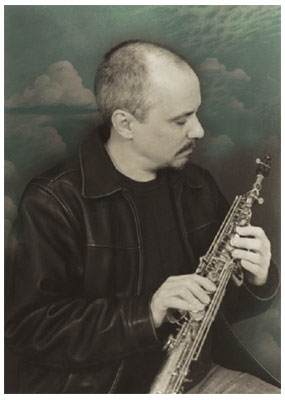 and Arthur Blythe, who became strong influences. The Charlie Parker on Dial compilations are important to me, as are the various Coltrane albums on Impulse, Atlantic, and Prestige. Eric Dolphy's Berlin Concert LP introduced me to his work, so that was a significant album to me. Later, Ornette's Atlantic albums proved to be a source of inspiration. And lately, I've been totally into Monk.
and Arthur Blythe, who became strong influences. The Charlie Parker on Dial compilations are important to me, as are the various Coltrane albums on Impulse, Atlantic, and Prestige. Eric Dolphy's Berlin Concert LP introduced me to his work, so that was a significant album to me. Later, Ornette's Atlantic albums proved to be a source of inspiration. And lately, I've been totally into Monk.
Jazznet: You have contributed to many records. Is there some of them in particular, you see as more important or landmarks in your production than others ???
Chris Kelsey: Each one is a representation of where I was creatively at the time it was made, so they're all of equal importance (or non-importance), I'd say. Renewal was important because it signaled a 'comeback' for me, of sorts. I'd virtually stopped playing my horn for a couple of years, and when I decided to get back to it, Renewal was the result, so in a way it's probably more important than some of the others. I suppose I like The Crookedest Straight Line, Vols. 1 and 2 the most of all my albums, but that could be simply because they're the most recent. In any case, I'm already moving in a different direction.
Jazznet: When i play improvised music for the people i know they sometimes don't seem to understand it and appreciate it the way i do. Are you some times in the situation that people don't understand your music, that it is misunderstood ???
Chris Kelsey: Sure. I tend not to present my music to people with no experience with or appreciation for avant-garde art, which may be a mistake, actually, because people are often more open than one might expect. Still, I understand that my music is not for everyone. And that's fine. Even people who are sympathetic to free jazz in general might not understand exactly where I'm coming from, and that's ok, too. The most I can hope for is to find someone with an open mind and open heart. I'll take my chances with a room full of people like that.
Jazznet: At your concerts and on your records as well, how much is improvised and how much is planned before start ???
Chris Kelsey: It depends. Sometimes I'll book a gig with people I've never played with, and we'll play totally free, with everything conceived in the moment. There's something special about such creative 'first encounters.' The freshness of playing with someone for the first time can be very inspiring. When I play with my regular group, however, we usually play my compositions, which are pretty much in the jazz small-group tradition, in terms of form. That means I use them as a platform to launch the improvisation and a sort of loose map to guide the performance. Even when we play my tunes, however, I try to keep it as flexible as possible. Ideally, I like to play a tune different every time, not deciding until we begin what form it will take. That approach isn't as evident on my recordings as it tends to be in live performance, incidentally.
Jazznet: What are you doing now, and what will be the next release from you and your projects???
Chris Kelsey: I'm considering a couple of different things. I've been transcribing tunes by a certain noted jazz composer who shall remain nameless; I think my next project will probably involve those tunes, although I'm not exactly sure of the context. I've also been working a lot with computer-based music. It's something I've done for years, without presenting it in public. That might change, soon. I recently saw a documentary about Federico Fellini that inspired me, as well. I can easily foresee a way to translate his filmmaking technique—which involved a lot of what I would call improvisation—into a jazz context.
Jazznet: If a new listener was about to buy his first recording with your music. Which one(s) would you recommend as the best introduction to your music ???
Chris Kelsey: That's a good question. I continue to evolve, so the most interesting project to me is the next one. I don't think too much about what I've already done. Any of the CIMPs I've done with bassist Francois Grillot and drummer Jay Rosen are representative of what I've been about. On The Crookedest Straight Line, Vols. 1 & 2, we added trumpeter John Carlson, which resulted in a new sound that I like very much. Vol. 2 might actually be the best introduction to my music, overall, since it's the most recent.
Jazznet: Do you have any plans of coming to Denmark to play some concerts in the future ???
Chris Kelsey: I would love to! Your country has a history of really supporting jazz, not only by welcoming musicians from the US, but by producing very fine native musicians, such as the great John Tchicai, and Marilyn Mazur. Of course, everyone has heard of the famous Café Montmartre, where so much great new music was played and recorded. There are some outstanding young Danish musicians. As you may know, I'm also a jazz writer. A couple of years ago, I reviewed an album that the young drummer Kresten Osgood did with Sam Rivers. Kresten's got a lot going for him, that's for sure. I understand he spent some time in New York, awhile back. I'm sorry I missed hooking-up with him. I'm also aware of the bassist Jonas Westgaard, who's a terrific player and composer. And I'm impressed with what I've heard of the pianist Søren Kjærgaard. I heard a thing he did with Andrew Cyrille that was very nice. As for firm, immediate plans to visit your country, I don't have any at the moment, though I hope that will change. If any of your readers are booking agents, club owners, or presenters, I hope they'll give me a call!
Jazznet: How would you categorize your music ???
Chris Kelsey: I don't know, really … It's based upon everything I've known and loved, musically, and most of the music I've known and loved has been jazz. It's free jazz, I suppose, but it's also informed by straight-ahead forms, as well as post-tonal classical music. Nobody thought of Miles Davis as a 'free jazz' musician, but his '60s band was as 'out' in its way as what Ornette and Coltrane were doing at the time. I guess I'm a free player, but what I do has little in common with what the mainstream free players in New York are doing—guys like Matt Shipp, William Parker, that crowd. I'm just doing what I do. I prefer not to think about categorizing it.
Jazznet: Are you inspired by some of the great masters of jazz like Ornette Coleman, Albert Ayler, Don Cherry and John Coltrane or who do you see as your inspiration ???
Chris Kelsey: Oh yes! All of the above! Not only them, but Miles, and Joe Henderson, Stan Getz, Lee Konitz, Warne Marsh, Eric Dolphy, Sonny Rollins … in fact, you'd have a hard time naming a great sax player who hasn't affected me positively, and inspired me in some way. And not just saxophonists--all types of instrumentalists: Cecil Taylor, Monk, Cherry, Lester Bowie. And not just avant-garde, but all types of jazz. I love Bix Beiderbecke, for instance.
Jazznet: If you should mention some artist who in your opinion are going to be the future of jazz and take it into the future, who should they be ???
Chris Kelsey: I doubt that we'll ever again see the kind of leading figures like Armstrong, Parker, Coltrane, and Miles--guys that dominate the public's perception of what jazz is at a given point in time. Jazz is splintered into so many sub-groups, no one artist is likely to be seen as 'the future of jazz,' in my opinion. That said, there's tons of wonderful music being made by young players. I mentioned your countrymen, earlier; there are creative, original young musicians like them all over the world. There's a Iranian-American trumpeter in New York named Amir ElSaffar whose music is an organic mixture of jazz and indigenous Persian music. He's a tremendous talent. Also, the trumpeter Taylor Ho Bynum does interesting stuff. The saxophonist Trygve Seim is a beautiful player. A young bassist/composer in New York named Michael Bates has a lot to say. There are just so many young players with fresh ideas on the planet; it bodes well for the music. Earlier, you asked a question about the rather porous boundaries that separate different forms of improvised music, which I took to mean jazz. But it could also mean non-idiomatic improvisation, rock-based improv, electro-acoustic improv, and other things. Elements of all those are finding their way into music that is essentially 'jazz,' which I think is great.
Jazznet: Which artist do you define as real jazz ??? and free jazz ???
Chris Kelsey: If by 'real' jazz, you mean straight-ahead jazz, I think there are manyartists around today doing the music a good service. Joe Lovano, ofcourse, can play in any bag and remain distinctively himself. GeorgeGarzone can, as well; he's a very fine player. Both those guys are veryspontaneous and expressive. I am most attracted to improvisers likethat--players with grit, soulful players who are less worried about polishthan about expressing strong feelings and original ideas with theirplaying. Both Lovano and Garzone are superb 'free' players, as well. I like the kind of players for whom 'free' and 'straight-ahead' are not mutuallyexclusive spheres. Joe Henderson was like that, Sonny Rollins is like that. As is David Murray, who is without adoubt my favorite contemporary saxophonist. I get compared with Steve Lacyall the time, who's great, and who had a profound influence on me, butMurray is the guy who really got me enthused about free jazz in the firstplace. He crosses the line between straight-ahead and free as well asanyone ever has, especially when it comes to maintaining a high level ofintensity and spontaneity. Of the musicians of whom it can be said  that they are primarily 'free' oravant-garde (and let's face it, they are the ones doing most of theinnovating), Ornette is still going strong, obviously. Just off the top ofmy head, I'd say the saxophonist/composer Guillermo Gregorio is aninteresting, lyrical player; I don't have many of his recordings but Ilike what I've heard. I just heard this young trumpeter, Rajesh Mehta,who's doing some very interesting work. The alto saxophonist BlaiseSiwula, someone I used to play with pretty often, is a terrific,inimitable free player. Mat Maneri is a wonderful musician, as is hisfather, Joe. There will always be a special place in my heart for JanGarbarek, as well. His music is beyond 'free' or straight-ahead oravant-garde. The guys I mentioned earlier (Trygve Seim, Taylor Ho Bynum, Michael Bates,etc.) are among the many younger cats I find interesting.Rhythm-section-wise, the guys in my band—bassist Francois Grillot anddrummer Jay Rosen—are 'free' players of the highest order. Neither getsthe kind of attention he deserves.
that they are primarily 'free' oravant-garde (and let's face it, they are the ones doing most of theinnovating), Ornette is still going strong, obviously. Just off the top ofmy head, I'd say the saxophonist/composer Guillermo Gregorio is aninteresting, lyrical player; I don't have many of his recordings but Ilike what I've heard. I just heard this young trumpeter, Rajesh Mehta,who's doing some very interesting work. The alto saxophonist BlaiseSiwula, someone I used to play with pretty often, is a terrific,inimitable free player. Mat Maneri is a wonderful musician, as is hisfather, Joe. There will always be a special place in my heart for JanGarbarek, as well. His music is beyond 'free' or straight-ahead oravant-garde. The guys I mentioned earlier (Trygve Seim, Taylor Ho Bynum, Michael Bates,etc.) are among the many younger cats I find interesting.Rhythm-section-wise, the guys in my band—bassist Francois Grillot anddrummer Jay Rosen—are 'free' players of the highest order. Neither getsthe kind of attention he deserves.
Jazznet: Frank Zappa once said "Jazz is not dead it just smells funny". What are your comments on that, do you think jazz is a dead and in serious need of a vitamin injection (like the one you are giving it) ???
Chris Kelsey: Zappa said that a long time ago—I think mostly to be funny. He was working in a different vein, an area that incorporated jazz and even classical elements but was mostly rock-based. A lot of rock guys feel alienated from jazz—for good reason, since jazz musicians too often look down their nose at rock guys. Hence, even a genius like Zappa might have felt an inferiority complex that caused him to lash out, albeit in a comic way. It seems to me, the music that gets the most attention is usually pretty stale. The Jazz at Lincoln Center crowd get an inordinate amount of praise for re-doing stuff that was innovative a half-century ago. That doesn't mean what they do has no value. It can be quite beautiful on its own terms—after all, we still listen to recordings of Basie and Ellington and enjoy them—but it's not contributing greatly to enhancing our understanding of the infinite possibilities inherent in jazz. Also, the kind of music that gets recorded by major jazz labels tends to be very safe. They are in the business of selling as many records as they can, so they're not going out on any aesthetic limbs, lest they lose their already tiny market share. Underneath it all, however, there's an extremely busy substrata that continues to experiment and innovate. You don't often hear these guys on the major labels, except for ECM. They record for the smaller labels. I hear a lot of them by downloading tracks from eMusic. If you think of jazz as the stuff that you hear on the major labels, and jazz musicians as the guys you see on the covers of the major US jazz magazines, then I could understand why one would think the music needs a vitamin injection. But people paying close attention know there's vital music going on all the time. I wouldn't write-off the major labels completely, either. Just because they're playing it safe now doesn’t mean they will forever.
Jazznet: Where do you see yourself, Mr. Chris Kelsey in 5-10 years, still making music for the masses ???
Chris Kelsey: Music is my dharma. I can't imagine not playing. I can't—nor would I want—to make plans five or ten years in advance, but as long as I live I will play music. Of that I'm quite sure.
Jazznet: What are your funniest and worst experiences performing in front of an audience ???
Chris Kelsey: Oh my God, the worst gig really stands out! It was in New York at the Knitting Factory's 'What is Jazz?' Festival, back in the '90s—I think 1996. I had a duo with trombonist Steve Swell, and were booked into a yuppie bar a couple of blocks away from the Knit. The place was filled with these young Wall Street types who came in after work to get drunk and pick up members of the opposite sex. And here we were: a soprano saxophonist and trombonist playing the most 'out,' free-est jazz you could imagine! They wanted Kenny G, and they were getting Lacy and Rudd. They hated us … and I do mean hated us! They yelled at us, and cursed at us. A few of the drunker guys threatened to beat us up. It was terrible, just awful. I can't believe the Knit booked us into that place. The funniest gigs were all as a member of this R&B band that I played with in the '80s. Many of those jobs were experienced in a beer-induced haze, so they all kind of blend together. I remember playing a biker bar in Norman, Oklahoma, and this really tough-looking biker chick took a liking to me. And when I say she was tough-looking, I mean she looked like she could beak me in two, if she wanted. She stood in front of the stage all night, staring at me, licking her lips, whispering lewdly, and at one point, raising her shirt. The latter happened in the middle of a solo, and since I tend to close my eyes when I play, I missed it. My fellow band members told me about it later! Playing those kinds of places was always so much fun—not artistically fulfilling, but a lot of fun.
Jazznet: What’s your best advice for young aspiring Jazz musicians ???
Chris Kelsey: Do what you have to do, and try to shut-out the nay-sayers, because they'll destroy you if you let them. Don't worry about anyone else—for instance, how much success so-and-so is having compared to you, or whether your playing sounds 'as good' as someone else's. You can only be you, and you have something unique to contribute. No one else in the world plays exactly like you. Be true to yourself. And stay focused on the present moment, because that's where everything happens.
Jazznet: On several of your recordings you have played with the great drummer Jay Rosen. How is it to work with such a personality as him ???
Chris Kelsey: Jay is great in every way—as a player, of course, but also as a person. He's open to anything; he has no ego as a player. It's all about making good music with Jay—making the collective group sound its best. He's got great ideas, tremendous chops, is sensitive to my every move. Really, I can't say enough positive things about Jay. He's one of the greats of his generation, for sure. My bassist, Francois Grillot, is tremendous, too. Like Jay, he's ego-less, open to everything, and extremely sensitive within the ensemble. Plus, he's just great fun to be around. I think Jay, Francois, and me have a very good chemistry. I consider myself very lucky to be able to play with them.
Musikken
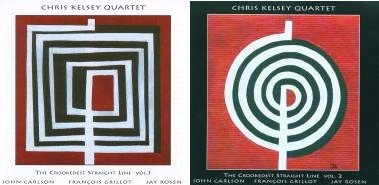 Chris Kelsey Quartet : The Crookedest straight line vol. 1 (CIMP 358) & The Crookedest straight line vol. 2 (CIMP 368).
Chris Kelsey Quartet : The Crookedest straight line vol. 1 (CIMP 358) & The Crookedest straight line vol. 2 (CIMP 368).
Chris Kelsey indspillede tilbage i 2006, over to dage i august disse sessions som er blevet udgivet som The Crookedest straight line volume 1 & 2. Chris Kelsey spiller på sopran saxofon med en varm og behagelig tone, og har også komponeret og arrangeret alle numrene på de to cd'er. Inspirationen - og respekten - fra de afdøde mestre på dette instrument Steve Lacy og John Coltrane er ikke til at overse. På disse sessions er hans medspillere John Carlson på trompet og flugelhorn, Francois Grillot på bas og den fantastiske trommeslager Jay Rosen, som har arbejdet sammen med blandt andet Joe McPhee og Dominic Duval i den spektakulære Trio-X. Jeg har altid været en kæmpe fan af sopran saxofonen og specielt hvad den fantastisk dygtige, Steve Lacy formåede på dette instrument. Det var derfor med stor spænding at jeg for et stykke tid siden læste om Kelsey og dernæst fik muligheden for at lytte til hans udgivelser. Chris Kelsey er en meget intens kunstner, med en virkelig suveræn, overbevisende og aggressiv, pågående spillestil. Sopran saxofonen er ikke det mest anvendte instrument i jazz musikken i dag, og det er virkelig en skam for det er i den grad et suverænt instrument hvilket disse to albums bevidner. Når så kunstneren der spiller på det er så dygtig, som det er tilfældet med Chris Kelsey, ja så går det hele op i en højere enhed og man når jazz nirvana. Disse to albums indeholder strukturerede og stærke kompositioner, fri improvisering - både fra de enkelte musikere og kollegialt. Chris Kelsey har selv udtalt om disse to albums, at de er hans nemmest tilgængelig og jeg er nok tilbøjelig til at give ham ret. Tag endelig ikke fejl, hans tidligere albums er virkelig også fede og i den grad overlegne, men de er i den kategori der kræver lidt mere af sin lytter. Jeg er blevet bjergtaget af Chris Kelsey og hans måde at spille på, og jeg er overbevist om at han vil henrykke mig med sit spil mange år fremover. The Crookedest straight line vol. 1 & 2 er to yderst solide albums, som vil tiltale de fleste jazz elskere, med deres overlegne tilgang til musikken og den nerve den bliver afleveret på.
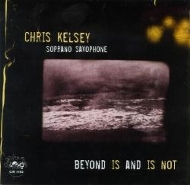 Chris Kelsey : Beyond Is And Is Not (Cadence Jazz 1183).
Chris Kelsey : Beyond Is And Is Not (Cadence Jazz 1183).
Chris Kelsey er en af de mest intense, sopran saxofonister på jazz scenen i dag. Det var med STOR spænding at jeg satte denne cd i afspilleren, for ville han kunne levere varen solo på en hel skive ??? Svaret er et overbevisende og rungende ja. Kelsey starter ud med det fantastiske nummer "Afro blue", et nummer som blev gjort kendt af John Coltrane og som Kelsey her gør til helt sit eget. Han blander den originale melodi, med sine egne ideer og varierer over det kendte tema. Dernæst er det Wayne Shorter's "Footprints" der bliver taget under kærlig behandlig og her tilfører Kelsey igen sit eget til den velkendte melodi. Nævnes bør også fantastiske udgaver af "Fried Bananas/Blue Monk", hvor Dexter Gordon flyder over i det velkendte Monk nummer på den mest imponerende måde og Chronology/Stella By Starlight, hvor Ornette Coleman's nummer bliver efterfulgt af den velkendte klassiker. Optagelsen er helt fantastisk, men kan høre når Kelsey trækker vejret og endnu mere imponerende når han gør brug af den cirkulære vejrtrækningsteknik. Denne session er en meget intim og nærværende af slagsen, og er en af de bedste solo horn sessions jeg nogensinde har hørt.
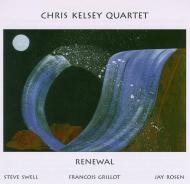 Chris Kelsey Quartet : Renewal (CIMP 309).
Chris Kelsey Quartet : Renewal (CIMP 309).
Renewal er en af de mere udfordrende Chris Kelsey udgivelser, en af dem som kræver lidt mere af lytteren da den er langt fra den tilgængelige (og kedelige) mainstream jazz. Chris Kelsey tager sig som vanligt mesterligt og overbevisende af sopran saxofonen, med sig har han Steve Swell på trombone, Francois Grillot på bas og Jay Rosen på trommer. Renewal er et udstyrsstykke ud i tighte arrangementer og krævende, insisterende soloer. Alle de medvirkende spiller meget overbevisende, med stor teknisk kunnen og eminente færdigheder på hver deres respektive instrumenter. Hver enkelt af numrene på denne cd er fulde af energi og kringlede, skæve overraskelser. Hver af de medvirkende bevæger sig mesterligt rundt i de kringelkrogede gange der tilhører free jazzen, altid udforskende, udfordrende og søgende. Kelsey er en meget dygtig musiker, han spiller agressivt uden at miste kontrollen. Cd'ens bedste nummer er det omkring 15 minutter lange "Charlie Parker's Last Will and Testament", hvor Kelsey er eneste horn, kun bakket op af Grillot på bassen og Rosen på trommerne - Fantastisk. Det er et virkelig tight og sammenspillet kvartet Kelsey har fået samlet her, alle de medvirkende følger hinandens mindste afstikkere og læser hinanden perfekt. En meget spændende og solid udgivelse du ikke bør gå uden om.